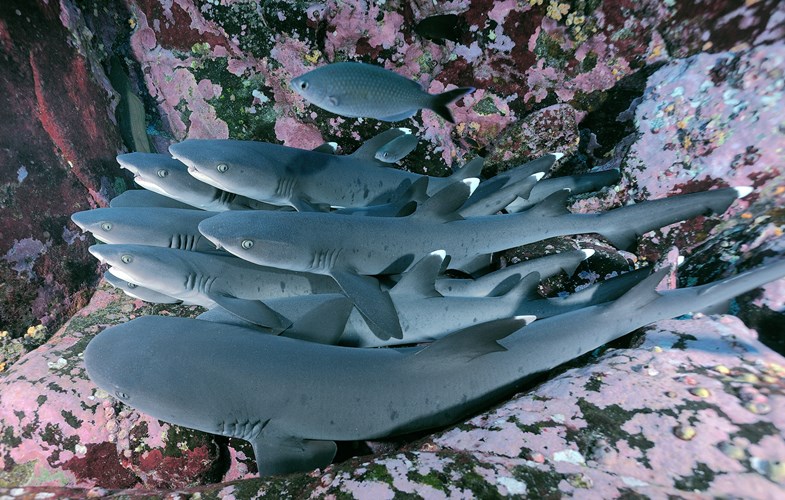Legal opinion: EU violates UN Fish Stock Agreement
Brussels determined to continue catching endangered and protected mako sharks
Brussels / Zurich / Munich, November 11, 2021. A few days before the start of the annual meeting of the regional fishery management organization ICCAT (International Commission for the Conservation of Atlantic Tunas), a legal opinion suggests that the negotiating position of the European Union violates the Fish Stock Agreement of the United Nations. The expertise confirms the criticism of the marine conservation NGOs Sharkproject and Pro Wildlife, who have been calling for an immediate retention ban for mako sharks in the North Atlantic. The (digital) ICCAT conference will negotiate the future of mako sharks in the Atlantic between November 15th and 23rd.
In their legal opinion, lawyers from the Universities of Leeds Beckett, Hamburg and Oxford conclude that the EU's opposition to a retention ban for mako sharks (i.e., no bycatch can be retained and landed any more) falls short to comply with the precautionary approach of the UN Agreement on Fish Stocks *. Since 2017, the Scientific Committee of ICCAT has been recommending a complete and immediate retention ban for mako sharks in the North Atlantic. According to ICCAT’s scientists, such a ban is required if this completely overfished Mako stock is to have a realistic chance of recovering within the next 50 years. "Nevertheless, the department of fisheries of the EU (DG MARE) continues to ignore the scientific advice and instead supports the interests of fisheries by allowing them to continue this profitable business, with mako sharks" criticizes Dr. Iris Ziegler from Sharkproject. In the EU, mako sharks are a welcome bycatch in the longline fisheries for tuna, swordfish and blue sharks with both, the meat and the fins being commercialized.
In 2019, mako sharks were included into Appendix II of the CITES Agreement ("Convention on International Trade in Endangered Species of Wild Fauna and Flora"), following an initiative by the EU and its conservation authorities. Since then, international trade in mako sharks should only be permitted if there is verifiable proof that such catch does not endanger the survival of the species. In the absence of a valid Non-Detriment Finding for mako sharks from the North Atlantic, the EU’s species environmental department DG ENVI decided to ban all landings from international waters in European ports as of January 1, 2021. DG MARE, on the other hand, ignoring this decision for the conservation of species, defined a unilateral landing quota for the EU fleet mid of January and de facto appears to be determined to avoid a retention ban being adopted at the upcoming ICCAT meeting by proposing overly complex and unworkable measures. Spain and Portugal are among the largest shark-catching nations in the world: In 2020, those two countries caught 1,200 tons of mako sharks in the North Atlantic alone.
Mako sharks have been classified as Endangered by the Red List of the International Union for Conservation of Nature (IUCN) since 2019, and the population in the Mediterranean Sea is even considered to be Critically Endangered. In a joint complaint, Sharkproject and Pro Wildlife turned to EU Vice President Frans Timmermans, who is responsible for the EU Biodiversity Strategy and the European Green Deal. "How can the EU expect to be credible in claiming leadership in global conservation of species, if it already fails its first praxis test in the negotiations for mako sharks so miserably?", states Dr. Sandra Altherr from Pro Wildlife in concluding.
* According to the legal opinion, this year's EU proposal is still not complying with the precautionary principle due to the extremely long restoration period and the resulting uncertainties for success, as well as the proposed method of calculation for such a potential retention of a still to be defined amount of bycatch. The authors note that the calculation relies on mortality data that are either not available or inadequate. They therefore recommend the implementation of a temporary retention ban at least until 2035, or even better until 2045 (the earliest point in time a recovery of this population is at all possible). This legal opinion has been commissioned by the Sustainable Fisheries and Communities Trust (SFACT).
Background Information
Link to the legal opinion: https://sfact.org/wp-content/uploads/2021/11/Mako-legal-opinion.pdf
Letter from Sharkproject and Pro Wildlife to EU-Vice President Frans Timmermans https://www.prowildlife.de/wp-content/uploads/2021/10/letter-Timmermans_mako-sharks_Sep-2021.pdf
Links to observer statements to ICCAT’s Panel 4: https://meetings.iccat.int/index.php/s/BsbDknaXlo8EbsK?path=%2FOctober_meeting%2FENG: Document PA4-05_OCT
https://www.sharkproject.org/en/blog/comment-on-iccat-meeting-for-makosharks/
Media contacts:
Dr. Iris Ziegler, Sharkproject, phone +49 174 379 5190, i.ziegler@sharkproject.org
Dr. Sandra Altherr, Pro Wildlife, phone +49 174 217 5054, Sandra.Altherr@prowildlife.de


